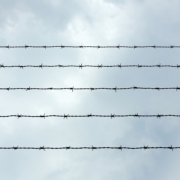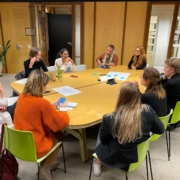Great Challenges, Lesser Expectations: Members of The Hague Humanity Hub Community on What They’d Like to See on the Agenda at COP27
By Sarah Bumberger
From 6 to 18 November 2022, the 27th International Climate Change Conference (COP27) took place in Sharm El-Sheikh, Egypt. Politicians, lobbyists, and representatives from over 190 countries, hundreds of NGO’s, and the world of business, met to negotiate the implementation of the Paris Climate Agreement and discuss the next steps in the fight against global warming.
With the unofficial theme of last year’s COP26 (in Glasgow, UK) being ‘keep 1.5 alive’, the strongest theme of this year seems to be ‘loss and damages’ financing: how wealthy countries should help developing countries adapt to the effects of climate change. This is especially pertinent as a huge proportion of historical emissions have come from a small number of wealthy countries
A large number of members of The Hague Humanity Hub are working for a greener, more peaceful world: we asked some of our members about COP27, what they would like to address if they were invited and what they would like to see agreed during these two weeks.
Read on to find out what Harriet Mackaill-Hill (International Alert), Anna Helmus (Polycentric) and Piotr Drozd (Leaders for Climate Action/Scaling for Impact) have to say.
If you were invited to COP27, what would you address?
Harriet Mackaill-Hill, Climate & Peace Advocacy Advisor points out, “If done right climate action can be peacebuilding. Climate is a threat multiplier, and plays into conflict dynamics, creating tensions or making them worse. This is why at International Alert we are calling for climate finance that is conflict sensitive, smart and inclusive to allow climate action to contribute to sustainable peace. For this to happen, conflict risks need to be fully part of the international climate negotiations. This entails ambitious and meaningful cooperation between the climate and peacebuilding sectors, but also governments, investors, and donors. This is crucial to achieving climate neutrality by 2050.”
Anna Helmus, Communications Advisor says, “SDG goal 7: affordable & clean energy for all. Within nations: legislation to compel nations to develop and implement national policies in regard to availability and affordability of energy for specifically those people with the smallest budgets. And across nations: legislation to compel nations to develop and implement international policies in regard to availability and affordability of energy for specifically those nations with the smallest budgets”.
Piotr Drozd, Chief Operating Officer at Leaders for Climate Action, would ask for more cooperation: “First, how to go (much) faster. Global emissions continue to rise and the world is on a trajectory to blast past the 1.5-degree goal despite 26 COPs. A number of ideas have been proposed, from agreeing a Fossil Fuel Non-Proliferation Treaty to a thorough rethink of how economies work, but they require both courage and imagination. Second, how to ensure broader representation. You must have seen the ‘family photograph’ of world leaders from the summit. There’s so many people missing in that photo – women, indigenous leaders, and youth representatives, among others. How can we work together if most of the world isn’t at the table?”
What would you like to see agreed during COP27?
“A meaningful ‘loss and damage’ funding facility for climate vulnerable countries in the Global South. To address some of the root causes of climate change, COPs and climate action need to be reframed from a technical effort to cut emissions to an approach that also addresses human rights and social inequality”, stresses Piotr.
Anna says that during COP27, an agreement on a: “Financial commitment from nations to both climate change mitigation investments as well as climate change impact recovery funds such as economic, financial damage due to drought or floods. Furthermore, an agreement on the development of new market models for especially G20 nations that incorporate societal value and include legislation that compel large companies to invest in climate mitigation & climate change impact recovery.”
“If I could wish for one thing to come out of COP27, it would be for the impacts of climate on conflict to be acknowledged in the final decision and for there to be pledges to integrate conflict considerations into the finance negotiations, and for this to have ensued from great cooperation between the climate and peacebuilding sector”, ends Harriet.
If you’d like to talk further about COP27, the Humanity Hub and KlimaatPositief are organising a debrief and dialogue to help professionals in The Hague understand the outcomes of COP27 and think about the next steps for real action on climate change. For more information, check out the event on our event calendar.









